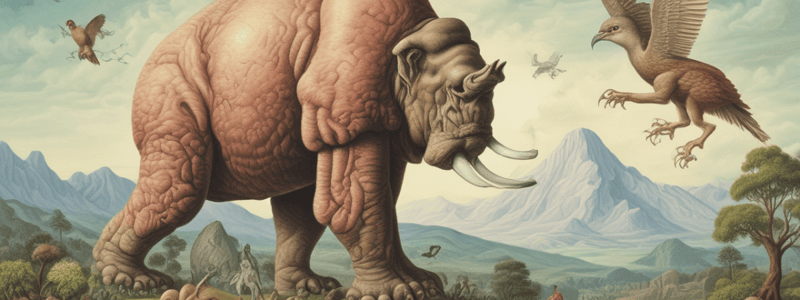Podcast
Questions and Answers
Who is the father of Evolution
Who is the father of Evolution
- Charles Davidson
- Charles Darwin (correct)
- Charles McGregor
- None of the above
Most of the earliest life forms on earth?
Most of the earliest life forms on earth?
- Plants
- Animals
- Archaeans (correct)
- Proterozoic
The name of the theory that expalins conditions for life as we know it is?
The name of the theory that expalins conditions for life as we know it is?
- Extraterrestrial theory
- Big bang theory
- Goldilocks theory (correct)
- Atomic theory
A group of closely related organisms that can reproduce with one another and create fertile offspring is a (n)?
A group of closely related organisms that can reproduce with one another and create fertile offspring is a (n)?
Living things that have the same evolutionary history often share common ______ that make them appear more similar.
Living things that have the same evolutionary history often share common ______ that make them appear more similar.
Flashcards are hidden until you start studying
Study Notes
Evolution: An Introduction to Natural Selection
Evolution, as described by Charles Darwin, is a process driven by natural selection. A significant portion of Darwin's theory revolves around the principle that species change gradually over time due to environmental pressures, leading to the development of new species. This transformation occurs primarily through natural selection rather than through sudden leaps or jumps in complexity.
Five Stages of Natural Selection
Natural selection can be broken down into five stages, known as the acronym VISTA: Variation, Inheritance, Selection, Time, and Adaptation.
Variation
Organisms within a species vary in traits, such as size, coloration, disease resistance, and various other characteristics. These variations are the result of random mutations, occurring when cells divide during reproduction.
Inheritance
As organisms reproduce, they pass on their DNA, containing the encoded instructions for building bodies, to their offspring. Due to variation, offspring often inherit the traits of their parents, leading to genetically influenced characteristics in subsequent generations.
Selection
Environments cannot support infinite populations due to resource limitations. Organisms compete for resources, such as food, mates, and territory. Those individuals best suited to their environment survive and reproduce, passing down advantageous traits to their offspring.
Time and Adaptation
Over time, adaptive traits become more prevalent within a population, increasing their likelihood of survival and reproduction. These adaptations improve the species' overall fitness and better equip them to cope with selective pressures in their environment.
Sympatric Speciation
One unique aspect of Darwin's theory is his suggestion that sympatric speciation - the formation of new species without geographical separation - can occur through the process of natural selection.
The Modern Synthesis and Genetics
The Modern Synthesis, developed in the 1930s, further delved into the genetic underpinnings of natural selection. By integrating genetics with evolutionary models, researchers gained deeper insight into the mechanisms driving speciation.
Understanding natural selection remains crucial for comprehending evolutionary processes, as it provides a foundation for understanding how species change over time and adapt to their environments.
Studying That Suits You
Use AI to generate personalized quizzes and flashcards to suit your learning preferences.
Description
Test your knowledge on natural selection, a fundamental concept in evolutionary biology, and the Modern Synthesis that integrates genetics with evolutionary theory. Learn about the five stages of natural selection and how adaptations lead to speciation without geographical separation.




